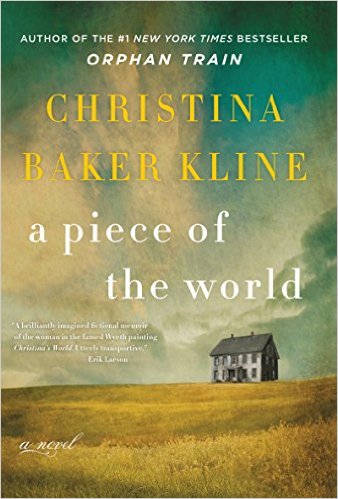Books |
Christina Baker Kline: A Piece of the World
By
Published: Feb 21, 2017
Category:
Fiction
Christina Baker Kline had published four novels — literary fiction, the deadliest of categories — when she handed “Orphan Train” to her publisher. The topic was niche: homeless children transported from eastern cities to the rural west from 1854 to 1929. The main characters were a 91-year-old woman and a troubled teen. Not a story or a cast that cries best-seller.
Kline’s last book had produced modest sales. If “Orphan Train” didn’t find a larger audience, the next stop for Kline could easily be self-publishing. And how’s this for unhelpful: Her publisher suggested putting it out as a paperback. An original paperback is born with every possible disadvantage: no reviews, minimal marketing and modest expectations. Reluctantly, Kline gave her approval, fearful that “Ghost Train” could disappear without a trace.
But early readers loved it, and they told their friends, and soon the book had a four-star review in People and was featured on NPR’s “Weekend Edition,” and then it became a New York Times bestseller, with sales topping two million in 35 countries. Target printed 30,000 separate “book club” copies and had Kline sign 10,000 of them. Twenty-five communities chose it as a common reading experience. If you’re in a book club, no way you didn’t read it. [To buy the paperback of “Orphan Train,” click here. For the Kindle edition, click here.]
Now, four years later, comes what is, for most readers, Christina Baker Kline’s second novel, “A Piece of the World.” The immediate inspiration is “Christina’s World,” Andrew Wyeth’s 1948 painting, on display at the Museum of Modern Art in New York. You’ve surely seen it — the 32’ by 48” painting shows a woman lying in the grass on a hillside. We share her point-of-view. And because we too are looking at a gray house and a barn at the top of the hill, we may not notice how thin her arm is.
Anna Christina Olson (1893 -1968) is the woman in the painting. She suffered from a degenerative muscular disorder that made walking impossible. But she refused to use a wheelchair. She crawled. Over the years, Wyeth made 300 pictures at her house in Maine, but it was the image of her crawling to pick blueberries that made him spend months on this painting. “The challenge was to do justice to her extraordinary conquest of a life which most people would consider hopeless,” he wrote. “If in some small way I have been able in paint to make the viewer sense that her world may be limited physically but by no means spiritually, then I have achieved what I set out to do.”
Christina Baker Kline had a different challenge: to tell Christina’s story in Christina’s voice. It’s an interior story: Christina’s actual world was, for most of her life, her house. For a writer to tackle a story with so little movement — hats off to Christina Baker Kline just for courage. I would not have attempted this book.
The early pages of the novel aren’t riveting. We meet young Andrew Wyeth and his bride. We learn the ancient history behind the family’s move to Maine. We get a postcard version of Christina’s childhood. It isn’t until page 32 that the young girl is confronted with her infirmity.
Wyeth had an infirmity of his own. A “twisted right leg and a faulty hip” made him gimpy as a child. “You’re like me,” he tells Christina. He confesses: “I am always painting myself.” And you get that Kline has written a love story — a rare, delicate, one-of-a-kind love story — and you’re hooked. [To read an excerpt, click here. To buy the book from Amazon, click here. For the large print paperback, click here. For the Kindle edition, click here. ]
There are other characters — father, mother, brother, a suitor — but the major character in Christina’s world is Christina. Though she’s locked in to her body and her house lacks every modern convenience, including plumbing, she’s exceptionally present. This is not a memory book. Or a self-pitying fictional memoir. If anything, it’s a kind of thriller. How much can she take before she breaks? And although she does break down — for a very good reason — she comes back, fiercely. “It’s painful to hold out hope for the things that once brought you joy,” she says. “You have to find ways to make yourself forget.” Who has not been there?
I’ve never liked Maine — it’s too cool in summer, bleak in winter. Too elemental for me, too… flinty. Christina is that. But also wise. The ultimate kindness is acceptance, she says. There are many ways to love and be loved. Long before the end — when Wyeth finally shows her the famous picture — I had reached for my pen and was underlining. In a story without much traditional drama, I found not just pleasure and passion, but one teachable moment after another.


